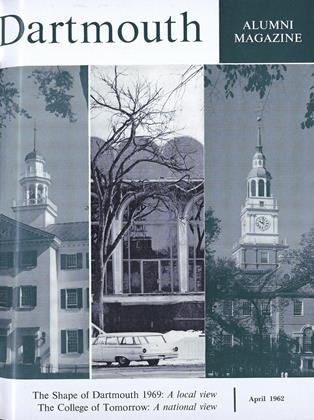By Mary Elting and Franklin Folsom '28. New York: Harvey House,1960. 160 pp. $2.95.
Mr. and Mrs. Folsom have attempted the most difficult task of preparing a children's book on a technical subject. From the technical standpoint they have succeeded very well indeed. While one might wish for a firmer realization that archaeology is only a technique within the "Study of Man," it is clear that they have prepared an accurate and painstaking review of what we now know of prehistoric America. Indeed if our Anthropology majors graduate with a solid command of all the facts in this volume, we should be very content with their coverage of this phase of the subject. The black and white drawings by Kathleen Elgin are excellent.
There is no doubt that the authors know their archaeology. It is not clear that they know children. The book is an example of the widespread and, I fear, erroneous belief that simplified statements'of a series of complex concepts constitute a sound introduction to a technical subject. Giving a child a well watered martini may prove stimulating, but I am not so sure that it is sound education. In this case I suspect that any child who would actually be interested in the difference between C" dating and dendrochronology would find the style of this text pedantic.
Since the place to test a pudding of this kind is in the digestive tract, I submitted this volume to a colleague of mine who seemed to be in a much better position to evaluate it than I. He reports:
"I thought the Story of Archeology had good illustrations but I found it hard to get really interested in the reading material. It seemed a bit childish in spots to me. For fast reference to one group of things or people this book would probably be good. I think it would have been better if the authors had concentrated more on presenting the facts in a more continuous manner instead of chopping it up with so many questions. This seemed so unnecessary." - Stephen Bueddeman, Grade 7.
 View Full Issue
View Full Issue
More From This Issue
-
 Feature
FeatureTHE SHAPE OF DARTMOUTH 1969
April 1962 By C.E.W -
 Feature
FeatureMost Exciting Place on Campus
April 1962 By JOHN R. SCOTFORD JR. '38, -
 Feature
FeatureWho will pay—and how?
April 1962 -
 Feature
FeatureTPC: MASTER PLANNER
April 1962 -
 Feature
FeatureWhat Role for the Alumni?
April 1962 By SIDNEY C. HAYWARD '26, -
 Feature
FeatureDartmouth's Ongoing Purpose
April 1962
ALFRED F. WHITING
Books
-
 Books
BooksFACULTY PUBLICATIONS
June, 1923 -
 Books
BooksINSIDE TENNIS: TECHNIQUES OF WINNING.
OCTOBER 1969 By CARLTON PENNINGTON FROST '18 -
 Books
BooksTHE FAMILY IN AMERICAN CULTURE,
January 1948 By ERVILLE B. WOODS. -
 Books
BooksBriefly Noted
MAY 1970 By F.H. -
 Books
BooksOut of the Night
November 1978 By R.H.R. -
 Books
BooksCharles Darwin Adams: Demosthenes and His Influence
AUGUST, 1927 By William Stuart Messer, Edwin J. Bartlett






